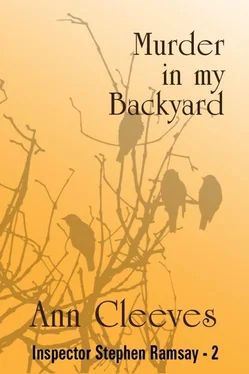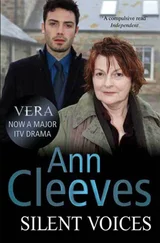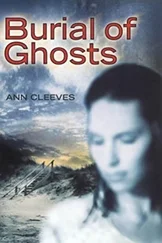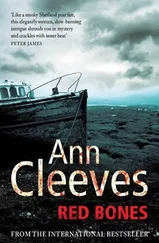Ann Cleeves - Murder in My Backyard
Здесь есть возможность читать онлайн «Ann Cleeves - Murder in My Backyard» весь текст электронной книги совершенно бесплатно (целиком полную версию без сокращений). В некоторых случаях можно слушать аудио, скачать через торрент в формате fb2 и присутствует краткое содержание. Жанр: Детектив, на английском языке. Описание произведения, (предисловие) а так же отзывы посетителей доступны на портале библиотеки ЛибКат.
- Название:Murder in My Backyard
- Автор:
- Жанр:
- Год:неизвестен
- ISBN:нет данных
- Рейтинг книги:5 / 5. Голосов: 1
-
Избранное:Добавить в избранное
- Отзывы:
-
Ваша оценка:
- 100
- 1
- 2
- 3
- 4
- 5
Murder in My Backyard: краткое содержание, описание и аннотация
Предлагаем к чтению аннотацию, описание, краткое содержание или предисловие (зависит от того, что написал сам автор книги «Murder in My Backyard»). Если вы не нашли необходимую информацию о книге — напишите в комментариях, мы постараемся отыскать её.
Murder in My Backyard — читать онлайн бесплатно полную книгу (весь текст) целиком
Ниже представлен текст книги, разбитый по страницам. Система сохранения места последней прочитанной страницы, позволяет с удобством читать онлайн бесплатно книгу «Murder in My Backyard», без необходимости каждый раз заново искать на чём Вы остановились. Поставьте закладку, и сможете в любой момент перейти на страницу, на которой закончили чтение.
Интервал:
Закладка:
Ramsay would have liked to take Mary Raven to his cottage in Heppleburn to talk to her. He would have been more comfortable there, without interruptions and telephone calls. He could have made her coffee and waited until she was ready to talk. But he knew it would not do and the interview would have to take place in the police station in Otterbridge, with its institutional furniture and the knowledge that somewhere in the same building James Laidlaw was being questioned, too.
At first she refused to go with him.
“It’s my story,” she said. “I need a phone and a typewriter. No other bugger’s going to get the glory after all this work.”
“It will be your story,” he said, coaxing her with his attention and his gratitude. “ There’ll be no press release tonight. All the papers will know is that James Laidlaw has been arrested. They’ll be desperate to talk to you tomorrow. And, you know, I might be able to give you some useful information.”
So she allowed herself to be helped into the back of his car, complaining only when he drove past the Castle Hotel without stopping to buy her a drink. At the police station he left her for a while in the company of a policewoman, but she seemed not to mind and from the corridor he saw her scribbling intensely in her notebook. He went to talk to Hunter. Laidlaw, it seemed, had started talking as soon as the car left Brinkbonnie and nothing could stop him.
“He asked to write a statement,” Hunter said. “He’s doing that now. He refused to see a solicitor. We’ll have no problem with a conviction.”
So when Ramsay returned to begin his interview with Mary, he knew most of the details of the case. But he gave nothing away. He was diffident, unsure, so she thought he needed her. He let her believe that it was her story after all.
“How did you find out about James Laidlaw’s racket?” Ramsay asked. They drank tea with a little whisky in it. They were at the top of the building and there were no blinds on the windows. Outside spotlights lit up the old walls that surrounded the town and the ruins of the abbey.
“It was just really a wild guess at first,” she said. She was more herself, excitable, proud. She was showing off. “ His decisions about which stories to run were so arbitrary. The Brinkbonnie development was just an example. When the plans first went before the council, he wrote an editorial about the destruction of rural communities. It didn’t bother him that Alice Parry was his aunt. Then, when the village started its own campaign, he began to talk about objectivity and ordered me off. I thought it was just some weird autocracy-that he wanted to show me who was boss-until I did court duty on the morning after Mrs. Parry died.”
She paused to catch her breath. He waited patiently and smiled to encourage her.
“People who appear in court are often much more worried about being in the paper than they are about the fine they receive from the magistrates,” she said. “ James usually did the monthly magistrates court and that was strange in itself. Most editors think themselves too superior to mix with petty criminals-they’re more likely to be taking the magistrates out to lunch. James said it was his way of keeping his finger on the pulse of the town, but of course it wasn’t that at all.”
Ramsay interrupted gently, reluctantly, showing her that he was entertained by her conversation, but that he needed all the details.
“What did happen when you were in the court that Monday?” he asked.
“There was this drunk driver,” she said, making the most of the drama, playing up to him, watching his reaction. “He’d been in court before and he was disqualified for twelve months. But he had his own business and was much more worried about the bad publicity than about losing his licence. He came up to me in the waiting room and asked if there was any way of keeping his name out of the paper. Of course I said it was impossible. He got quite cross and said he had heard it was possible to come to an arrangement about it. He was a wealthy man, he said. Money was no object. At first I thought he was just an isolated loony who was trying it on, but when I considered it later he seemed indignant, almost self-righteous, as if I was treating him unfairly.”
“So James was taking bribes from people who had appeared in court and wanted the fact kept secret?”
“Yes,” she said, and her eyes sparkled because he was listening to her so carefully and following her line of thought so well. “But that wasn’t all he was doing.”
She paused dramatically while he poured her more whisky, then, although he already knew what was coming, he waited, attentive for her next revelation.
“The odd twenty quid to keep a bank manager’s name out of the paper was only chicken feed,” she said. “That wouldn’t keep our Stella in designer frocks and fancy kitchens. So James got more ambitious and the racket with local businesses started.”
“When was that, Mary?” Ramsay asked, quiet and apologetic. “When did the local business racket first start?”
“Years ago,” she said. “Perhaps even before I started on the paper.”
“Tell me,” he said. “ How did it work?”
“Well,” she said, tantalising him, the perfect performer. “Of course I don’t know all the details…”
“But it’s your story, Mary. You know how it worked.”
“Oh, yes,” she said. “ I know how it worked. James Laidlaw, the great investigative journalist, threatened to put people out of business if they didn’t pay him lots of money. That’s how it worked.”
“How could he do that, Mary? I need to know.”
“He snooped,” she said. “He was a bloody good reporter. He followed leads, listened to rumours. He found out all the things that people wanted to hide. And if they were clean as the driven snow, he started the rumours himself.”
“What about evidence?” Ramsay asked. “ You’ll need evidence for your story.”
“There are some people willing to talk,” Mary said. “ There’s May Smith in the cottage hospital. She’ll talk to you.”
“May Smith?” Ramsay said, although Hunter had been visiting her only hours before. “Who’s she, Mary?”
“She’s an old lady. She was a resident in the White Gates old people’s home. She liked it there. She was happy. But the place had to close because James ran a campaign about it in the Express. Relatives of the old folks who lived there took them away because they thought everything you read in the papers is true.”
“Why did he run the campaign, Mary?”
“Because the matron refused to pay him protection money.”
“Why didn’t she go to the police?”
“Would you have believed her?” Mary demanded. “After all the publicity there’s been about the ill treatment of old people in nursing homes? Or would you have thought she was making the whole thing up to protect her business?”
“Perhaps,” Ramsay said. “But we would have looked into the complaint.”
“And you would have found nothing!” she said. “ No witnesses, nothing. None of the other old people’s homes in the area would admit to paying up in case the same thing happened to them. James Laidlaw was a powerful man, and married to a Rutherford. They were frightened of him. They thought he was worth a fortune.”
She paused again, went to the window, and looked down on the street.
“Someone did tell the police what James was doing,” she said. “Joe West, the county councillor. Do you remember him? But you were too busy investigating the allegations of fraud James was making in the Express to take any notice.”
Ramsay thought. He remembered Joe West, though he had not dealt with the investigation personally, and he could recall no connection in the case with the Express. It was something about fraudulent expense claims for his council work. And he had had his house painted, Ramsay remembered, by council workmen using materials paid for by Northumberland County. In the end they had decided not to prosecute. How many other councillors, after all, could claim total honesty if there was a major investigation? Joe West had resigned and they had considered the matter at an end.
Читать дальшеИнтервал:
Закладка:
Похожие книги на «Murder in My Backyard»
Представляем Вашему вниманию похожие книги на «Murder in My Backyard» списком для выбора. Мы отобрали схожую по названию и смыслу литературу в надежде предоставить читателям больше вариантов отыскать новые, интересные, ещё непрочитанные произведения.
Обсуждение, отзывы о книге «Murder in My Backyard» и просто собственные мнения читателей. Оставьте ваши комментарии, напишите, что Вы думаете о произведении, его смысле или главных героях. Укажите что конкретно понравилось, а что нет, и почему Вы так считаете.












